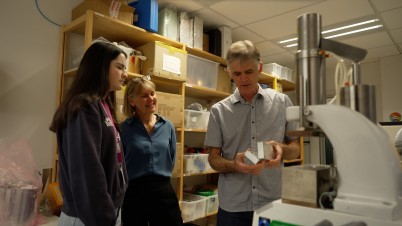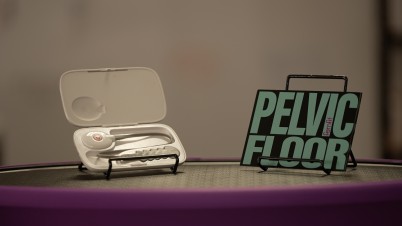In the evolving landscape of women's health, JUNOFEM stands out as a beacon of innovation and empowerment. Co-founded in 2019 by Dr Jenny Kruger, the business is dedicated to addressing the often-overlooked issue of pelvic floor dysfunction. Jenny discusses her journey from academia to entrepreneurship and the challenges and highlights the company has faced during the past five years. She also explains how strong offshore connections and strategic partnerships have been crucial to the company’s growth in the tough UK market.
Kiwi business JUNOFEM emerged from a blend of academic insight and a desire to address an urgent clinical need. Co-founder Dr. Jenny Kruger and her team at Auckland University’s Bioengineering Institute, secured a government grant which Jenny says allowed them to embark on the research and development and set up Junofem as a commercial entity.

“About ten years ago, we recognized there was a lack of tools available to measure pelvic floor function. There was nothing on the market that could provide the feedback women needed to know if they were performing pelvic floor exercises correctly. This insight, combined with guidance from urogynecologists and physiotherapists, led us to develop a device that could meet this critical need.”
However, the journey was anything but straightforward. Not long after the team began to establish itself in the medical device space, the pandemic hit, with their CEO was stuck in Australia, the team had to pivot and in 2021 raised their first seed round and officially positioned Junofem as a medical device company in the New Zealand, and Australian market.
“The transition required a comprehensive reorganisation of our manufacturing processes and compliance with rigorous regulatory standards. Obtaining approval from Australia’s Therapeutic Goods Administration was a big moment for us as was the success of our first seed round, It felt validating to have external investors believe in our vision.”
Another, more personal challenge for Jenny was the steep learning curve transitioning from academia to entrepreneurship
“The biggest challenge for me was adjusting to the commercial landscape. Research is a very different world than growing a company. I had to reinvent myself and adapt to new criteria for measuring success, which was a significant shift.”

Despite the challenges, the positives have been immensely rewarding. The biggest one Jenny says has been helping countless women regain control over their lives
“The feedback from users—women who have experienced life-changing improvements—fuels the team's motivation. “Those testimonials validate our work and remind us why we do what we do. Our mission has always been to instil confidence in women, and show them that our device, femfit®, can effectively alleviate symptoms of pelvic floor dysfunction, which is unfortunately quite common and it’s great to hear we are really succeeding in this.”
As Junofem continues to grow, partnerships have played a crucial role in their expansion, especially in international markets. Through connections made via Kea Connect, have allowed the team to access valuable resources.
“Kea’s Regional Director in the UK has been instrumental in helping us navigate the UK market. We’ve made connections in banking, marketing, and beyond, which has been vital for our brand’s growth. I have been able to meet some really high profile, highly connected people who I never would have met otherwise, it’s been good to have those connections and know they all have a Kiwi background somewhere along the way.”
For those looking to expand their business internationally, Jenny says the biggest piece of advice would be to do your homework.

“Ensure there’s a market for your product. The UK, for instance, has a recognized service called the mummy MOT, which aligns perfectly with what we offer. The growing conversation around menopausal health in the UK also presents another strategic opportunity for Junofem.”
Looking ahead, Jenny says she’s excited about the potential for Junofem to continue making an impact.
“There’s so much we can do to raise awareness about pelvic health, and I feel lucky to have the support of organisations like Kea Connect. They’ve facilitated invaluable connections that would have been otherwise inaccessible.”
As Junofem forges ahead, its mission remains steadfast: to empower women with the knowledge and tools they need to take charge of their pelvic health. With a focus on community and collaboration, Jenny Kruger and her team are well on their way to making significant strides in the global conversation around women’s health.